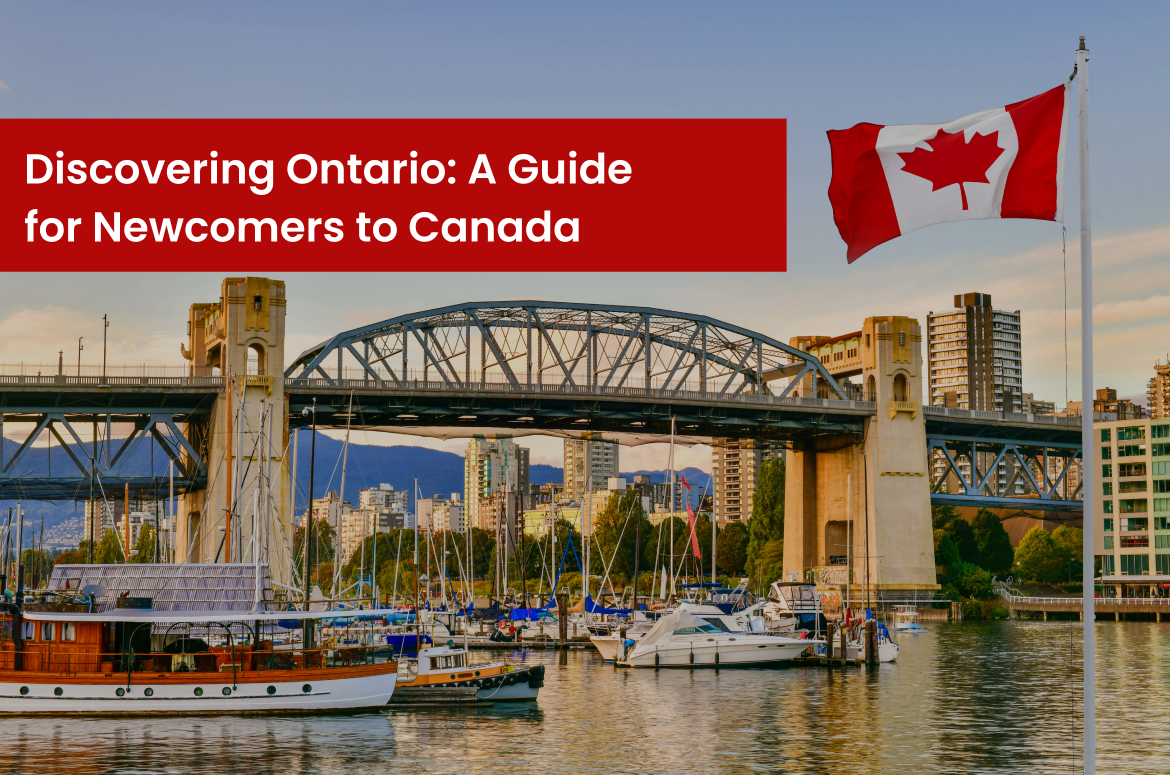Introduction:
Ontario, Canada’s most populous province, is a magnet for newcomers seeking a fresh start. With a population exceeding 15 million, Ontario boasts numerous opportunities for immigrants, a vibrant housing market, and an enviable quality of life. In this guide, we’ll explore various aspects of life in Ontario for newcomers, from housing and commuting to employment, healthcare, education, taxation, and available newcomer services.
Housing:
Ontario’s housing market is the largest in Canada, featuring over 5.4 million properties. The province’s housing prices and property types vary depending on factors such as location and family size. As of August 2023, here are the average rents for one-bedroom and two-bedroom apartments in Ontario’s three largest Census Metropolitan Areas (CMAs):
One-Bedroom: Toronto ($2,592), Ottawa ($1,951), and Hamilton ($1,855)
Two-Bedroom: Toronto ($3,370), Ottawa ($2,358), and Hamilton ($2,271)
Commuting:
Ontario’s public transportation system is extensive, with at least 80% of residents living within 500 meters of a public transit access point. Cities like Toronto, Hamilton, and Ottawa offer their own transit systems. However, the majority of Ontarians prefer using personal vehicles for commuting. Newcomers should be aware that:
For the first 60 days as a new Ontario resident, you can use your home country-issued driver’s license.
After 60 days, you must obtain an Ontario driver’s license from the provincial government.
Get health insurance: Canada has a public healthcare system, but it does not cover international students. You will need to purchase private health insurance to cover any medical expenses that may arise while you’re in Canada. Make sure you have adequate coverage before you arrive in Canada.
Find affordable housing: Housing is one of the biggest expenses for international students in Canada. You can save money by living off-campus or by sharing an apartment with other students. Many universities and colleges offer on-campus housing, but it can be expensive. Research your options and choose the one that best fits your budget.
Prepare for the climate: Canada has a diverse climate, with some regions experiencing harsh winters. Make sure you pack warm clothing, such as coats, boots, and hats. If you’re not used to the cold, you may find it challenging to adjust. Consider purchasing winter clothing and equipment when you arrive in Canada.
Ontario’s job market is diverse and robust. The top three industries in terms of employment are:
Trade occupations: Retail and Wholesale Traders
Healthcare and social assistance: Doctors, Nurses, Social Workers
Manufacturing: Mechanical Engineers, Lab Technicians
To find job opportunities in Ontario, you can visit the provincial government’s Employment Ontario page.
Healthcare:
Ontario operates under a universal healthcare model, funded through resident taxes. Unlike some provinces, newcomers in Ontario are eligible for provincial healthcare coverage immediately upon arrival, provided they possess a valid health card. While most healthcare services are free through OHIP (the Ontario Health Insurance Plan), certain treatments and medications may require out-of-pocket expenses. Hence, private health insurance can be essential for residents.
Education:
Ontario’s education system welcomes children from the age of six through high school, with over 400,000 licensed childcare spaces available across the province. The public school system is free, but Ontario also offers private and boarding school options, which require tuition payments. For post-secondary education, Ontario boasts more than 500 Designated Learning Institutions (DLIs), which can lead to a Post-Graduation Work Permit (PGWP) upon completion. The PGWP opens doors to various Canadian permanent resident immigration pathways.
Taxation:
Ontario’s sales tax, the Harmonized Sales Tax (HST), stands at 13%. Income taxes vary based on personal income and are levied on all working Ontario residents, with rates varying by income bracket. More information on Ontario income tax can be found on the official website.
Newcomer Services:
Ontario offers a wide range of newcomer services, both government-funded and private. These services are available before, during, and after your move to the province. To find settlement services, you can use resources like 211 Ontario, accessible by phone at 2-1-1 or through their website. Additionally, a list of government-funded newcomer settlement services, categorized by service type and province, is available for reference.
Conclusion:
Ontario’s diversity, opportunities, and high quality of life make it an attractive destination for newcomers to Canada. From housing and employment to healthcare and education, this province offers numerous advantages for those embarking on a new journey. Remember to explore available newcomer services to help ease your transition and make the most of your Ontario experience.




